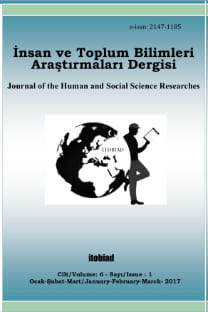BAPK Projelerinin Öneri ve Kabulünde EFQM Mükemmellik Modeli Etkisinin Değerlendirilmesi
Çalışmada amaçlanan, üniversitelerin özkaynaklarını kullanarak finanse ettikleri projelerin, EFQM mükemmellik modelinin kriterleri ile uyum sağlayıp sağlamadığı ve projelerin kabul edilmesinde ön plana çıkan özelliklerin ne olduğunu ortaya koymaktır. Sakarya Üniversitesi BAPK birimi, 2010 yılında aldığı kalite ödülü gerekçesiyle çalışmamızın örneği olarak seçilmiştir. Çalışmada, araştırmanın güvenirlilik ve geçerliliğini sağlayacak şekilde doküman analizi, içerik analizi ve mülakat tekniği ile veri çeşitlemesinin kullanıldığı üç aşamalı bir araştırma stratejisi izlenmiştir. Sonuç olarak, BAPK tarafından en çok kabul edilen projeleri öneren birimlerin EFQM modeli rehber kriterlerini zaten benimsemiş bir bilgi üretim ve eylem yaklaşıma sahip oldukları anlaşılmıştır.
The Evaluation of the Effect of EFQM Excellence Model in Proposal and Approval of BAPK Projects
The study is intended to find out projects financed by university's equity, can adapt to the criteria of the EFQM excellence model or not and what features come to the fore when projects have been accepted. BAPK department in Sakarya University receives quality award in 2010 have been selected as an example of the study. In this study, it is used triangulation technique with document analysis, content analysis and interviews in data to ensure the reliability and validity of the research and a threestage research strategy was followed. As a result, it is understood that the programs which propose the most widely accepted projects by BAPK have an approach to knowledge production and action apply to already adopted EFQM Excellence Model criteria.
___
- Currie, J. and L. Vidovich. “The Changing Nature of Academic Work”. M. Tight, K. O. Mok, J. Huisman and C. C. Morphew (Ed.). International Handbook of Higher Education. (New York: Routledge Press, 2009), p.441-453. EFQM Mükemmelik Modeli -Kamu ve Sivil Toplum, KALDER, Brüksel, Belçika: Avrupa Kalite Yönetimi Vakfı, 2003. EFQM Mükemmelik Modeli, KALDER, Brüksel, Belçika: Avrupa Kalite Yönetimi Vakfı, 2010. EFQM Özdeğerlendirme Yöntemleri Ve Uygulama Rehberi, KALDER, Brüksel, Belçika: Avrupa Kalite Yönetimi Vakfı, 1999-2001. Harris, Susan, “Rethinking Academic Identities in Neo-Liberal Times”. Teaching in Higher Education. 2005,10: 4, October, p. 421-433. Marginson, Simon, “Markets in higher education: Australia”, J. Smyth (Ed.) Academic work, (Buckingham: Open University Press, 1995), p.17-39. Marginson, Simon, “Rethinking Academic Work in the Global Era”. Journal of Higher Education Policy and Management. 2000, 22: 1. Musselin, C. “The Transformation of Academic Work: Facts and Analysis”, Research&Occasional Paper Series, University of California, Berkeley: CSHE-Center for Studies in Higher Education, 2007.
- M. Tight, K. O. Mok, J. Huisman and C. C. Morphew. International Handbook of Higher Education. New York: Routledge Press, 1999 Künye: Memiş, Pınar, Çitçi, Umut S., “BAPK Projelerinin Öneri ve Kabulünde EFQM Mükemmellik Modeli Etkisinin Değerlendirilmesi”, İnsan ve Toplum Bilimleri Araştırmaları Dergisi I, (2014): 54-74.
- ISSN: 2147-1185
- Yayın Aralığı: Yılda 4 Sayı
- Başlangıç: 2012
- Yayıncı: Mustafa SÜLEYMAN ÖZCAN
Sayıdaki Diğer Makaleler
II. Meşrutiyet Dönemi Batıcılık Akımının Ahlak Anlayışının Değerlendirilmesi
Kolektif Hafıza ve Milli Kimlik Bağlamında Türkiye'de Resmi Tarih Yazıcılığı
Yuliya BİLETSKA, Cemile ŞAHİN, İsmail ŞÜKÜR
Televizyon Yayınlarının Yönlendiği Eğlenceli Yapımlardaki Toplumsal Gerçek: Gülmece Gereksinimi
Cihat Hakkında Ehl-i İslama, Asker-i İslama Kürsi-i İslam’dan Bir Hitap
Avram Galanti: Türkiye’de İlk Katolik Kapusin Manastırlar
Türkiye ve Belçika’nın Atık Yönetimi Politika ve Uygulamalarının Karşılaştırmalı Analizi
Bozkır Türklerinde Ekonominin Hayvancılık ve Tarıma Dayalı Olarak Değerlendirilmesi
BAPK Projelerinin Öneri ve Kabulünde EFQM Mükemmellik Modeli Etkisinin Değerlendirilmesi
